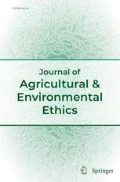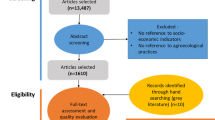Abstract
In The Agrarian Vision, Thompson argues that a better appreciation of agrarian ideals could lead to a more virtuous, more sustainable way of life. While I agree with Thompson in many respects, there are some aspects of the book that I question and others that I would like to hear Thompson explicate in greater detail. In this paper, I question Thompson’s claim that agrarian farmers and farming communities serve as ideal models of virtuous habits and good character. I challenge Thompson’s use of virtue theory, particularly the notion that farming virtues can be acquired without participating in farming practices. In the end, I make the point that Thompson seems to vacillate between being realistic and being idealistic, which may seriously complicate our notions of responsibility and obligation in practice.
Similar content being viewed by others
Notes
It is worth noting the cover image of Wendell Berry’s Bring It to the Table: On Farming and Food, published 2009. It depicts a room full of sun-burnt male farmers, in overalls, seated around a table. The four women in the picture, in dresses and aprons, are on their feet, working in the kitchen or serving food to the men. This nostalgic image seems to glorify patriarchal social ordering and rigid gender roles.
I would argue that the agrarian vision need not be nostalgic and backward-looking. Witness the success Will Allen and Growing Power Inc. have had creating closed-loop food systems in urban areas of Milwaukee and Chicago (http://www.growingpower.org/).
For example, people like Gautama Buddha, Socrates, and Jesus of Nazareth.
See pp. 180–183.
In “Getting Pragmatic About Farm Animal Welfare,” Thompson seems to suggest that the most effective way to improve the lot of farm animals is to build a network of producers and consumers who are dedicated to animal welfare (Thompson 2004, 156).
The agrarian vision seems to be tacitly at odds with modern capitalism.
Personally, I am inclined to side with Aristotle and suggest that we must be habituated in agrarian farming practices to acquire these agrarian virtues. To accomplish this, we may need to broaden our vision of farming to include: home gardens, rooftop gardens, community gardens, edible school gardens, farming camps/internships, and urban farms. I find great inspiration in the urban farming that has been established by Growing Power, Inc. (http://www.growingpower.org/index.htm).
References
Aristotle (2000). Nicomachean Ethics (R. Crisp, Trans.).New York: Cambridge University Press.
Berry, W. (1977). Jefferson, Morrill, and the upper crust, in The Unsettling of America (pp. 143–169). San Francisco: Sierra Club Books.
Berry, W. (2002). The pleasures of eating. In Norman Wirzba (Ed.), The art of the commonplace: The Agrarian essays of Wendell Berry (pp. 321–327). Washington, D.C.: Shoemaker & Hoard.
Berry, W. (2009). Bring it to the table: On food and farming. Berkeley: Counterpoint.
Curtin, D. (1999). Putting down roots, in Chinnagounder’s Challenge (pp. 170–192). Bloomington: Indiana University Press.
Dewey, J. (1989). The nature of moral theory. In J. A. Boydston (Ed.), The later works (Vol. 7, pp. 162–183). Carbondale: Southern Illinois University Press.
Norton, B. G., & Hannon, B. (2003). Democracy and sense of place values in environmental policy. In A. Light & H. Rolston (Eds.), Environmental ethics (pp. 500–515). Malden, MA: Blackwell Publishing.
Thompson, P. B. (2000). Thomas Jefferson and agrarian philosophy. In P. B. Thompson & T. C. Hilde (Eds.), The agrarian roots of pragmatism (pp. 118–139). Nashville: Vanderbilt University Press.
Thompson, P. B. (2003). Expanding the conservation tradition: the agrarian vision. In B. Minteer & R. Manning (Eds.), Reconstructing conservation: Finding common ground (pp. 77–92). Washington: Island Press.
Thompson, P. B. (2004). Getting pragmatic about farm animal welfare. In E. McKenna & A. Light (Eds.), Animal pragmatism: Rethinking human-nonhuman relationships (pp. 140–159). Bloomington: Indiana University Press.
Thompson, P. B. (2010). The agrarian vision: Sustainability and environmental ethics. Lexington: The University Press of Kentucky.
Wirzba, N. (2003). Introduction: Why agrarianism matters–even to urbanites. In N. Wirzba (Ed.), The Essential Agrarian Reader (pp. 1–16). Berkeley: Counterpoint.
Acknowledgments
I would like to thank Paul B. Thompson and Raymond Anthony for inviting me to participate in this session.
Author information
Authors and Affiliations
Corresponding author
Additional information
An earlier draft of this paper was presented at an author-meets-critics session at the Agriculture, Food, and Human Values Society’s annual conference, Food in Bloom (2010).
Rights and permissions
About this article
Cite this article
McBride, L.A. Agrarian Ideals and Practices: Comments on Paul B. Thompson’s The Agrarian Vision . J Agric Environ Ethics 25, 535–541 (2012). https://doi.org/10.1007/s10806-011-9332-4
Accepted:
Published:
Issue Date:
DOI: https://doi.org/10.1007/s10806-011-9332-4




